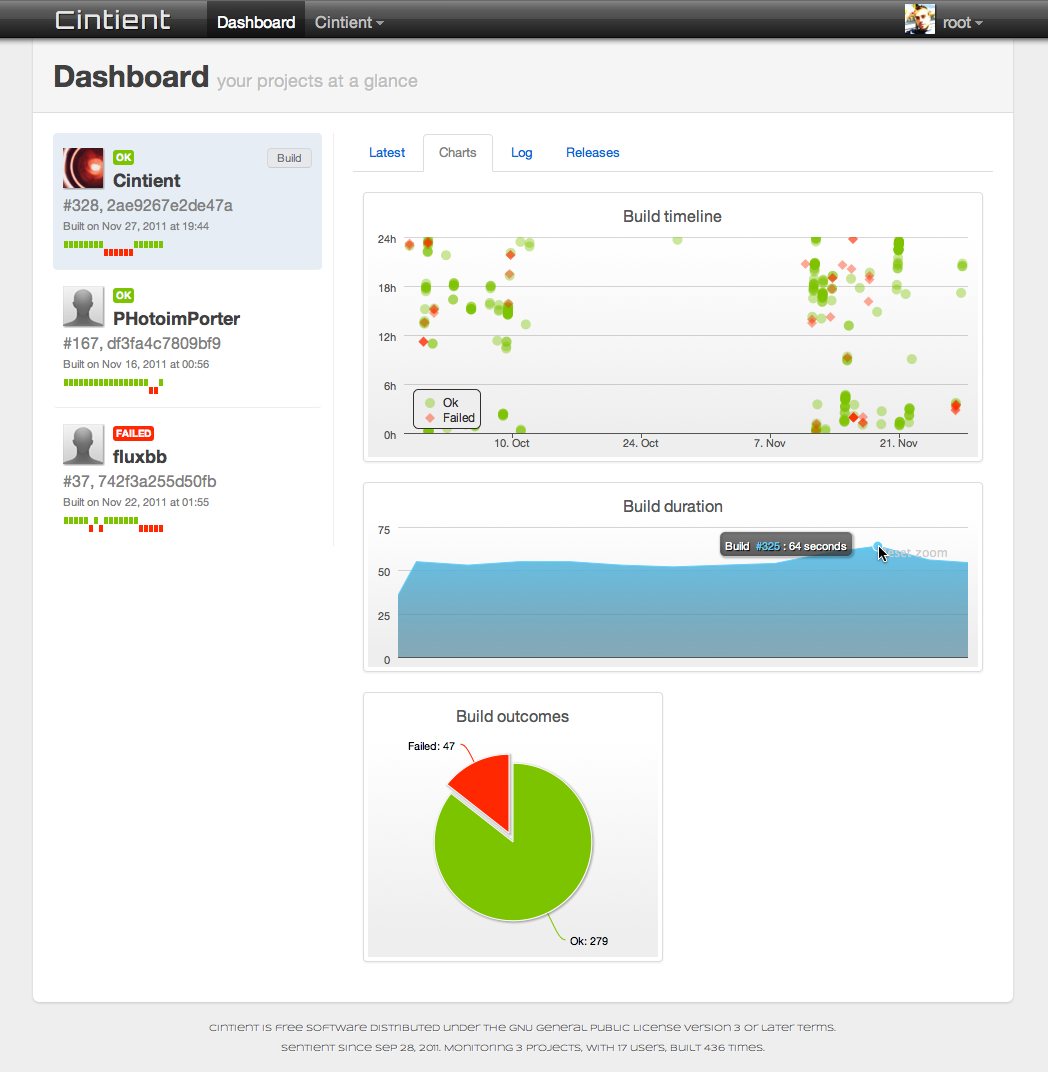Cintient is a Continuous Integration web application written in PHP. It was written to be simple to setup and straightforward to use and aims to bring CI practices to most small to medium projects that just don't justify the setup of a more complex CI solution.
Cintient - Continuous Integration made simple.
Cintient is a Continuous Integration self-hosted web application written
in PHP. It was written to be simple to setup and straightforward to use
- with special attention to UI - in order to bring CI practices to most
small to medium projects that just don’t justify the setup of a more
complex CI solution.
Screenshot #1

Screenshot #2

Screenshot #3

What it does
Cintient works by keeping track of all commits going into a source code
repository. Every time a change in the source code of a project is
detected, something called an “integration builder” is automatically
run. This integration builder can be completely configured to do
whatever the user wants - ranging from simple code syntax checks, to
more complex software quality analysis. The results are collected and
shown in a variety of charts that you can use to inspect your projects.
With such automation you can have every single commit be thoroughly
checked for syntax errors, be unit tested, inspected for violations to
your adopted coding standard, etc., all without requiring human
intervention. Whenever any of these checks fail, the build fails, and
Cintient promptly push-notifies users of such. Below are some of
Cintient’s features:
- easy one-time setup of the application (1 minute)
- visual edition for builder tasks, i.e., no messing around with Ant
XML sources for configuring builds - Web-based push notifications (currently supports the now deprecated
Notifo.com, but it’s easily extendable to others) - PHP syntax checking tasks
- PHPUnit integration for unit testing
- PHPDepend for quality metrics
- PHPCodeSniffer for coding standards enforcement
- Code coverage support (PHP Xdebug extension required)
- Perl syntax check (just so you know you can add support to pretty
much every language you want)
Disclaimer
Cintient is still beta. Please understand that not everything is yet
perfect. You should keep in mind the following:
- I develop mainly in Mac OS X and Linux, using Safari and ocasionally
Firefox. Other OS/browser flavours are still pretty much untested.
Please help out if you can. - Setting up a project in Cintient is way simpler than in any other
CI server I know of. But it still requires some minimum effort on
your part to properly configure it. Don’t give up, and let me know
if you’re having problems with anything.
Requirements
- Apache HTTPD with mod_rewrite (for the automatic installation). Supports
Lighttpd with minimum manual setup. - PHP 5.3.3 or later
- PHP with sqlite3 version 3.3.0 or later
- [Optional] Xdebug (for PHP code coverage support)
Installing
Check the requirements above. You need them in order to perform an easy
install. Go through the following steps:
- Your Apache web server’s configuration must allow you to specify per
directory .htaccess files and mod_rewrite directives within them.
For this you need to have at least “AllowOverride FileInfo”. Also,
enable “Options FollowSymLinks” and “DirectoryIndex index.php”. If
you’ve changed these just now, don’t forget to restart your Apache
server. If you are using Lighttpd instead, don’t do anything now and
follow the instructions. - Open up a browser window, navigate to the directory where you
unpacked Cintient. You should see the installer coming up. - Follow the instructions. It should only take you a minute to
finish. If you are not using Lighttpd, you’re done. Have fun. - If you are using Lighttpd, don’t refresh the page after the
install runs, just yet. Before that, make sure that you place the
contents of the .cintient-lighttpd.conf file in your web server’s
configuration and restart it. Then, and only then, you can refresh
the browser at the end of the install run. You’re done now. Have fun.
Contributing
Willing to contribute? Awesome! Fork the project in GitHub and send some
pull requests our way.
Credits
Authored by:
- Pedro Mata-Mouros,
Twitter: @matamouros,
email: [email protected]
Past contributors:
- rasismeiro
- voxmachina
- miguellmanso
Project page: http://github.com/matamouros/cintient